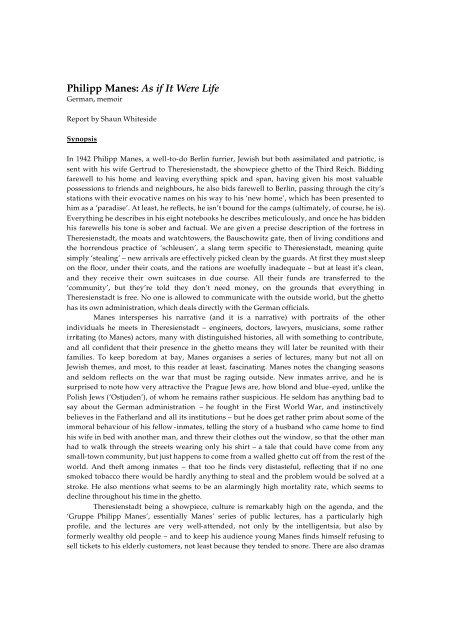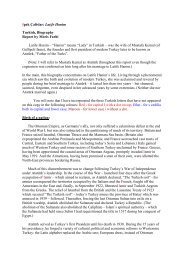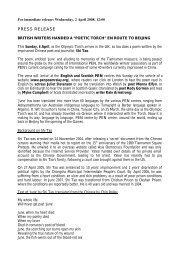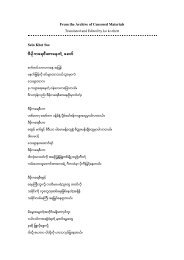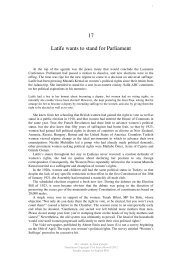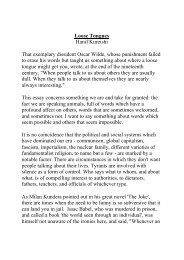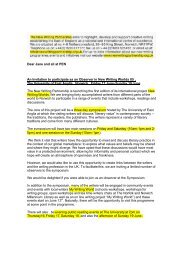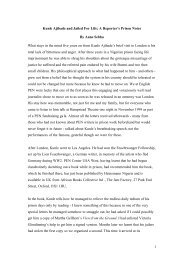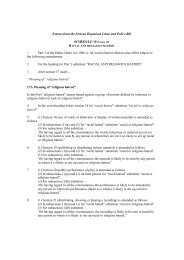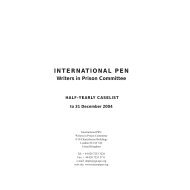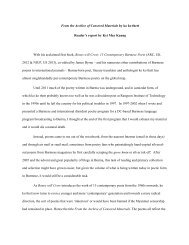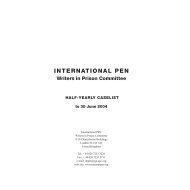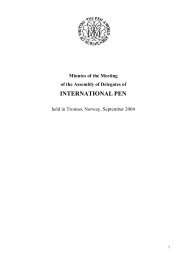Philipp Manes: As if It Were Life - English PEN
Philipp Manes: As if It Were Life - English PEN
Philipp Manes: As if It Were Life - English PEN
Create successful ePaper yourself
Turn your PDF publications into a flip-book with our unique Google optimized e-Paper software.
<strong>Philipp</strong> <strong>Manes</strong>: <strong>As</strong> <strong>if</strong> <strong>It</strong> <strong>Were</strong> L<strong>if</strong>e<br />
German, memoir<br />
Report by Shaun Whiteside<br />
Synopsis<br />
In 1942 <strong>Philipp</strong> <strong>Manes</strong>, a well-to-do Berlin furrier, Jewish but both assimilated and patriotic, is<br />
sent with his w<strong>if</strong>e Gertrud to Theresienstadt, the showpiece ghetto of the Third Reich. Bidding<br />
farewell to his home and leaving everything spick and span, having given his most valuable<br />
possessions to friends and neighbours, he also bids farewell to Berlin, passing through the city’s<br />
stations with their evocative names on his way to his ‘new home’, which has been presented to<br />
him as a ‘paradise’. At least, he reflects, he isn’t bound for the camps (ultimately, of course, he is).<br />
Everything he describes in his eight notebooks he describes meticulously, and once he has bidden<br />
his farewells his tone is sober and factual. We are given a precise description of the fortress in<br />
Theresienstadt, the moats and watchtowers, the Bauschowitz gate, then of living conditions and<br />
the horrendous practice of ‘schleusen’, a slang term spec<strong>if</strong>ic to Theresienstadt, meaning quite<br />
simply ‘stealing’ – new arrivals are effectively picked clean by the guards. At first they must sleep<br />
on the floor, under their coats, and the rations are woefully inadequate – but at least it’s clean,<br />
and they receive their own suitcases in due course. All their funds are transferred to the<br />
‘community’, but they’re told they don’t need money, on the grounds that everything in<br />
Theresienstadt is free. No one is allowed to communicate with the outside world, but the ghetto<br />
has its own administration, which deals directly with the German officials.<br />
<strong>Manes</strong> intersperses his narrative (and it is a narrative) with portraits of the other<br />
individuals he meets in Theresienstadt – engineers, doctors, lawyers, musicians, some rather<br />
irritating (to <strong>Manes</strong>) actors, many with distinguished histories, all with something to contribute,<br />
and all confident that their presence in the ghetto means they will later be reunited with their<br />
families. To keep boredom at bay, <strong>Manes</strong> organises a series of lectures, many but not all on<br />
Jewish themes, and most, to this reader at least, fascinating. <strong>Manes</strong> notes the changing seasons<br />
and seldom reflects on the war that must be raging outside. New inmates arrive, and he is<br />
surprised to note how very attractive the Prague Jews are, how blond and blue-eyed, unlike the<br />
Polish Jews (‘Ostjuden’), of whom he remains rather suspicious. He seldom has anything bad to<br />
say about the German administration – he fought in the First World War, and instinctively<br />
believes in the Fatherland and all its institutions – but he does get rather prim about some of the<br />
immoral behaviour of his fellow -inmates, telling the story of a husband who came home to find<br />
his w<strong>if</strong>e in bed with another man, and threw their clothes out the window, so that the other man<br />
had to walk through the streets wearing only his shirt – a tale that could have come from any<br />
small-town community, but just happens to come from a walled ghetto cut off from the rest of the<br />
world. And theft among inmates – that too he finds very distasteful, reflecting that <strong>if</strong> no one<br />
smoked tobacco there would be hardly anything to steal and the problem would be solved at a<br />
stroke. He also mentions what seems to be an alarmingly high mortality rate, which seems to<br />
decline throughout his time in the ghetto.<br />
Theresienstadt being a showpiece, culture is remarkably high on the agenda, and the<br />
‘Gruppe <strong>Philipp</strong> <strong>Manes</strong>’, essentially <strong>Manes</strong>’ series of public lectures, has a particularly high<br />
profile, and the lectures are very well-attended, not only by the intelligentsia, but also by<br />
formerly wealthy old people – and to keep his audience young <strong>Manes</strong> finds himself refusing to<br />
sell tickets to his elderly customers, not least because they tended to snore. There are also dramas
and musical concerts of an unusually high order, and he singles out the playwright Georg Kafka<br />
for particular approval, noting with regret that Georg Kafka and his mother had recently left<br />
Theresienstadt on the most recent transport. In fact (not recorded here) Kafka and his mother<br />
were sent to Auschwitz, and Georg Kafka died in the Schwarzheide concentration camp. So,<br />
towards the end of the book, <strong>Manes</strong> chiefly gives an account of his lecture programme and brief<br />
biographies of his most eminent colleagues. He has settled into a routine and reached an<br />
accommodation with his circumstances. Until of course the day comes when he and his w<strong>if</strong>e are<br />
sent on a transport to Auschwitz and the story comes to an end.<br />
The book’s editors are at pains to point out that <strong>Manes</strong> is a man of his time and must be<br />
treated as such, and also that of course when writing his notebooks he had no idea what was<br />
going to happen – what the ending was going to be. But that is precisely where the book’s<br />
fascination lies – although he writes of his circumstances with a certain detached irony, he is<br />
ultimately respectful not only of his fellow-inmates but also of the German authorities. <strong>It</strong> is his<br />
trust that is so hard to bear – the former front-soldier, the cultivated businessman, the patriot<br />
ultimately destined for destruction like the rest. <strong>As</strong> <strong>if</strong> it were a l<strong>if</strong>e would form a valuable<br />
companion-piece to Alice Herz-Sommer’s Theresienstadt memoir A Garden of Eden in Hell, and<br />
also to Viktor Klemperer’s valuable I Will Bear Witness. A level-headed account of an utterly<br />
extraor dinary situation, <strong>Manes</strong>’ book is required reading for anyone seriously interested in this<br />
dreadful period.<br />
Sample translation<br />
Deportation from Berlin, July 1942<br />
And this is the beginning of the last three dreadful days of our stay in Berlin – which lie behind<br />
us like a bad dream. What account can I give of them, what is there to say? <strong>It</strong>’s too painful to<br />
describe those work-filled hours in which we had to say goodbye to property, assets and people.<br />
<strong>It</strong> was still incomprehensible – we had to hand over everything we owned, everything<br />
we had acquired in our thirty-seven years of marriage. Very dear memories linked us with every<br />
piece – each picture had its history, each piece of furniture had become a member of the family.<br />
Strangers would acquire our belongings, they would rummage through drawers and pigeon -<br />
holes and pull out the things that struck them as worthless, our dear possessions. Barely<br />
conceivable.<br />
We began to clear things out, give them to people. Everything was taken away and<br />
quickly distributed. My last books, the notes, those brown volumes that my father had collected<br />
in his youth, the ordinary writing paper, the headed company paper, crockery, crystal, the<br />
kitchen utensils, it all had its takers. And so the apartment was quickly emptied.<br />
The pictures stayed on the walls. Only the old oil painting, Bacharach, was saved. I gave it<br />
to Fredi.<br />
I was still sitting at the desk – my beloved desk, my loyal companion over thirty-sven<br />
years, which still bore that burn-mark that Annemarie had dealt it. I wrote letters of farewell to<br />
all our friends and enclosed our last pictures. They were to go on Wednesday – <strong>if</strong> we can no<br />
longer be contacted.<br />
Our last night in our own beds came. We got up at six o’clock. Luggage had already been<br />
taken away the day before. And now we were waiting to be collected by the police. The<br />
apartment had been cleared and cleaned, ready to be swept.
I went from room to room. Here we had had the painful farewell to Walter and Lilli.<br />
There Annemarie said goodbye to me. Over there Eva hugged us for the last time. There Rudolf’s<br />
big picture gazed down from its silver frame.<br />
In the bedroom my photograph, taken in Hamburg in 1897, the last thing my mother<br />
saw.<br />
Outside in the corridor the old portraits of my grandparents on the <strong>Manes</strong> side, who had<br />
once looked after Aunt Ida in New York and brought her back. Gone, all gone.<br />
The kitchen cleared empty. In the corridor the white cupboards, still full of stuff. The jug<br />
and ewer once given to us by the children for our silver wedding anniversary. Outside on the<br />
balcony the crates with the fat hens that my mother had been so proud of – empty. The chairs on<br />
which we had sat so often in the evening, Walter had bought them, stood stacked one on top of<br />
the other, likewise the tables, one of which had belonged to Grandmother Elias. In the little room<br />
the lovely mahogany music cupboard, the couch that Walter had left behind. All the things I<br />
could list of our property, from the midst of which we were now about to be taken away, like<br />
criminals who no longer have a will of their own.<br />
Loud knocks on the door at about half-past nine. I opened up. Gestapo officers – two<br />
Jewish assistants. Our hand luggage is carried downstairs. I walk through all the rooms with the<br />
gentlemen, who are perfectly friendly. They look in the cupboards and ask <strong>if</strong> there’s any food in<br />
there that might go off. We’ve left nothing behind.<br />
I’ve forgotten the money-box, it contained about 100 marks. Should brighten the day of<br />
whoever finds it. Our last minute in our home.<br />
The gentlemen urge us to get going – it’s time, they say. Without looking round, we go<br />
outside. The door is locked. The key given to the caretaker, who is afraid to say ‘goodbye’ to us.<br />
A removal van stops outside the house, and we climb into it up some steps. The vehicle<br />
struggles to get going. <strong>It</strong> still has to pick up lots of people who have been evacuated, like<br />
ourselves. <strong>It</strong> goes first to Magdeburgerstrasse, then to Stettinerstrasse, then on to Martin<br />
Lutherstrasse.<br />
There’s even a couple who turn up – the Bries – we used to see him often in the hall, and<br />
it turned out that he knew Arnold Heilbut. When we reach another flat it turned out that the man<br />
who was supposed to be leaving had passed away, and had therefore, as Herr Brie said, chosen<br />
the better option.<br />
We sat there in silence – while we had been driving around the west of the city it had<br />
turned three o’clock. We finally stopped at today’s destination, the Jewish community’s old<br />
people’s home in Grosse Hamburger Strasse. Our details were registered and we were assigned<br />
to our rooms.<br />
We were too late for lunch. <strong>It</strong> wasn’t till evening that we received a ration. After the<br />
excitements of the long day we went to bed early, to get up reasonably fresh the following day.<br />
We were cut off from the world, we weren’t allowed out, we couldn’t send any mail.<br />
From the row of windows at the back we looked out on to the ancient graves with their<br />
muddle of half-submerged stones. The grave of Moses Mendelssohn, surrounded by railings,<br />
showed its tall obelisk, a sign reminding us not to give up.<br />
Later, when I came down to the corridor, I had a most thrilling and moving reunion. Frau<br />
Oberländer, who looked after my beloved mother, and whom I have never forgotten, threw her<br />
arms around me. I wept violently, and for the first time I lost the composure I had managed to<br />
keep until then. Down in that narrow passageway, crammed with people, I saw once again the<br />
home in Lichterfelde where I had so often spoken to that kind woman, requesting something for<br />
my mother. Again I saw that skilled nurse feeding my sick mother scrambled egg and holding<br />
her lovingly in her arms.
My mother’s dear room opened up and I saw her in the armchair. Everything I had taken<br />
such care of is now scattered for ever to the four winds – gone with the wind. When I wanted to<br />
collect my thoughts I often sat in that chair, which stood in the little room. I had imagined that<br />
the fine mahogany chest of drawers – it had been owned by my aunt Rosette Hornemann, and<br />
she brought this precious piece with her from Strasbourg – was safe and sound at Ella’s. Now it<br />
too is here in the ghetto and something that I wanted to save has been sold off for a few marks.<br />
The little mahogany wardrobe – how small and uncomfortable it was – has for sixty years<br />
loyally and dut<strong>if</strong>ully served its purpose of holding clothes. Adeline wanted to take it – but she<br />
shared our fate of living in a very cramped space.<br />
Such reunions are thrilling and emotional. A great eruption slings up the lava that has<br />
encased our innermost being because we didn’t want to let things get us down. A fixed, rigid<br />
outward appearance. At dead of night we can weep, for ourselves alone, when we no longer wish<br />
to hold back the slow flow of our tears. Only that way can we remain steadfast during the day.<br />
The old people’s home has become a beehive. Downstairs, the hand luggage and<br />
suitcases that were permitted, stacked up into tall piles. Everywhere policemen and Gestapo<br />
officers. We didn’t know what awaited us, when we would set off and under what<br />
circumstances.<br />
Till then we had shivered as w e heard of conditions in the vast area of the synagogue on<br />
Levetzowstrasse, of people being marched through icy cold or rain to the far-off Grünewald<br />
station. How the old people dragged themselves laboriously along, wheezing under their<br />
unfamiliar burden.<br />
And we heard of the train made up of cattle-trucks, with a tub to be used as a toilet.<br />
There was even talk of open trucks, into which the poor people were crammed at temperatures<br />
far below zero. Questions flew back and forth, everyone claimed to know somet hing, and they all<br />
had their information from the very best sources. But even the woman leading us could only tell<br />
us that we could stay calm, that we would reach our destination in a safe and sound.<br />
We shuttled back and forth – there were groups standing all over the place – and were<br />
surprised to encounter various acquantainces, or discover connections through various<br />
conversations. I carefully read the panels above the doors, with the names of the donors who had<br />
lent their names to the rooms. The letters were often a hundred years old and the whole series of<br />
famous Jewish families, whose grandchildren might even have been baptised by now, formed a<br />
list of ‘benefactors’, carved in stone, who had donated a small part of their fortune to the<br />
community, which thus expressed its gratitude for their gesture.<br />
Now the rooms were stripped of their comforts, there were no old pieces of furniture to<br />
ensure a proper rest before a great long journey. The comfortable upholstered chairs by the<br />
window, which had once always been covered with blossoming flowers, had vanished. No dear,<br />
wrinkled faces gazed down into the narrow street – which leads from the north to Unter den<br />
Linden. Gone – gone.
Downstairs in the corridor the people jostled one another, those incapable of travelling<br />
were examined to see <strong>if</strong> they could stay behind. The senior doctor walks importantly through the<br />
crowd, sees no one and is deaf to those who try to speak to him.<br />
[ … ]<br />
A jolt – we’re off.<br />
On the right, regards from Karlsbad [Tiergarten-Süd], Lützowstrasse, Yorckstrasse. The<br />
old familiar names glide past, my beloved Lichterfelde.<br />
[ ... ]<br />
Yes, but Theresienstadt has been presented to us as a paradise, and one for which we<br />
have sacr<strong>if</strong>iced our fortunes. That was how they spoke in the little room that served as the<br />
suitcase storeroom, where community officials were busy persuading those due for imminent<br />
transportation to hand over to their community their personal assets, meaning bank accounts,<br />
papers and so on. <strong>As</strong> they told us that everything would be confiscated by the state the following<br />
day, and only immediate transfer would save and safeguard these endangered sums for the<br />
Jewish community, and that they would use them for the benefit of all, people signed the form<br />
with genuine enthusiasm and left the room with their heads held high.<br />
Now I no longer owned anything – from now on my account at the Dresdner Bank, in the<br />
branch at number 2 Spittelmarkt, ceased to exist. I never took my allotted monthly payment of<br />
300 Reichsmarks, since I wanted to save to be able to survive until the end of the war. <strong>As</strong> long as I<br />
was working for Petkowitsch and earned 60 Reichsmarks a week before tax, I could manage on<br />
that and didn’t need to take anything from the account, particularly since I earned a little extra<br />
here and there and didn’t need to scrimp and save. But what was one going to spend it on in<br />
Berlin, where all groceries were rationed, where Jews were banned from buying anything and<br />
were only allowed the bare minimum required to live?<br />
Arrival in Theresienstadt, July 1942<br />
On July 23, 1942 Berlin Transport I/29 arrived in Bauschowitz. We, the hundred new arrivals,<br />
were lined up in rows of three – young people wearing stars took the luggage we couldn’t carry<br />
ourselves away for safe keeping – the suitcases were loaded on to cars, and the last load consisted<br />
of the people who couldn’t walk. Those of us who were still light on our feet slowly walked<br />
down the street leading to the nice, clean town. <strong>It</strong> was there that we first saw Czech inscriptions<br />
side by side with German ones. The inhabitants paid no attention to us as we passed, they had<br />
been used to the sight for months. <strong>It</strong> was a hot day, we soon felt the unfamiliar burden of our<br />
rucksacks – our hands were occupied with our bags, and so walking became more and more<br />
arduous – and the chain of people began to dr<strong>if</strong>t apart. But our escorts urged us to hurry, ‘look,<br />
those red roofs there, standing out against the dark green of the trees, those are the barracks of<br />
Theresienstadt, we’ll be there soon.’ But the road still twisted and turned for a good long time –<br />
for those of us unused to carrying things every hundred metres became a torture. The Czech<br />
gendarmes in their handsome un<strong>if</strong>orms walked ind<strong>if</strong>ferently on, and seemed to understand the<br />
hardship of the old people – not an angry word was spoken, even though we were soon walking<br />
at a snail’s pace.
Finally we had a clear view of moats and embankments, to us they looked like something<br />
enchanted. That there should still have been such a fortress, nearly two hundred years old, well<br />
preserved, the stonework as good as new, the deep, broad ditches of the ramparts, lush green at<br />
the bottom. Then the embankments pressed closer together, closing into a narrow passageway<br />
watched over by manned bunkers – the Bauschowitz Gate. We passed through it, suspecting<br />
nothing. Now we were admitted to Theresienstadt, the ghetto, our new home. In the streets that<br />
we passed through we saw well-dressed people, pretty young girls, cheerful children.<br />
<strong>It</strong> must be possible to live here, we thought – so it seems they weren’t lying in Berlin,<br />
when the council officials spoke of the paradise of Theresienstadt and congratulated us on being<br />
sent here rather than to Lublin.<br />
The road stretched endlessly on.<br />
Still no end to our torment. Dusk began to fall, and our escorts called, ‘We’ve reached our<br />
destination – Aussiger Barracks.’<br />
We heard the word ‘Schleuse’.<br />
Meant nothing to us. We were admitted into a semicircle of bunkers, from which<br />
passages led diagonally upwards. They extended into large, extended spaces, whose walls were<br />
at least a metre thick. Tables, on one side the gendarmes, us on the other, and now the ‘schleusen’<br />
began. We quickly worked out what it meant and watched with a shudder as practised hands<br />
dipped questingly into every bag, rucksack or basket, removing valuable objects, medicine, good<br />
scissors, razor-strops and – to our horror – the carefully filled thermos flasks, brandy, our last<br />
reserves of strength, chocolate, biscuits, everything vanished in a flash.<br />
We sat anxiously on the few narrow benches, waiting for our shattered and exhausted<br />
bodies finally to get some rest. Just to lie down, to lie outstretched and sleep! No feeling of<br />
hunger, no thirst, sleeping, just sleeping. And again suddenly a command: pick up your things,<br />
time to go to your quarters.<br />
More marching, then. <strong>It</strong> must be so, we are prisoners, we have to obey. Everyone<br />
struggled to get ready, picked up their luggage, which had grown lighter, and in the last grey<br />
light of day, which had been such a long and painful day for us, we stumbled out into the street,<br />
saw low, one-storey buildings, big barrack squares, a lovely church set apart from the rest, more<br />
houses, but no people now. Then we were standing by a barracks gate, and walked through it<br />
thinking cheerfully that we had reached our destination – at last, at last. That was all we saw, we<br />
were shown to a room on the ground floor, the walls covered with raffia – our sleeping quarters.<br />
We asked no questions, we said nothing, we immediately lay down with our clothes on,<br />
using our rucksacks as pillows, covering ourselves up with our coats – and lie, don’t think, sleep.<br />
But the sleep we longed for didn’t come as quickly as that, the agitation of our d<strong>if</strong>ficult<br />
farewell still quivering within us, we had, after all, just given up all the things of which our lives<br />
consisted, we had consigned our money and valuables, down to the last pfennig, to the hands of<br />
strangers, and moved to a foreign country without so much as a mark in our wallets. The clever
ones among us, however, hid notes in safe places, and they were later able to buy bread and<br />
synthetic honey in the ghetto, as well as the cigarettes that were so hotly sought-after (there was a<br />
fixed rate for everything, according to supplies), and thus improve their monotonous fare.<br />
An electric lightbulb faintly lit the whitewashed, clean-looking room. A cool draught<br />
blew in through the open windows, the f<strong>if</strong>ty people all slept soundly and peacefully. We couldn’t<br />
feel the hardness of our beds, we lay there, left to our own devices, our own thoughts which<br />
dr<strong>if</strong>ted time and again into the distance, to our far-off children – oh, <strong>if</strong> only they knew that their<br />
old parents were lying here on the floor, covered with a coat, possessing nothing more than what<br />
they carried with them. And now came sleep, the great consoler, the benefactor, and admitted me<br />
along with the others into the great army of those who first sank into dreamless nothingness on<br />
the hard floor of a barracks that was two hundred years old.<br />
Writing about the Deportations, October 1944<br />
The deportations are continuing, at a faster pace. Arrangements are presented to the central<br />
office, which decides who is to be placed in the transport and who will stay here for the time<br />
being. All the measures suggest that the only old people who will stay here are those who are<br />
capable of moving, and who can therefore quickly prepare for a transport in case of emergency.<br />
Being prepared is everything again.<br />
On Saturday [October] 14 people started dr<strong>if</strong>ting to the Schleuse, and once again the<br />
check began as it always did. Many people I had become truly fond of are lined up, and they all<br />
speak to me, and they always thank me for my two years of work and emphasise what those<br />
years have given them, saying they will never forget me.<br />
[ ... ]<br />
Theresienstadt has assumed a d<strong>if</strong>ferent face, the streets are empty, the old people walk,<br />
or creep, silently around. Most of our young people have gone, to work somewhere or other. The<br />
war, which previously left us untouched and uninvolved, now stretches its greedy paws out to<br />
us, too, here in our seclusion.<br />
If our l<strong>if</strong>e changes from the ground up once again, these are the bitter necessities, the<br />
hard obligations of a harsh time, fetching everyone who can still move their limbs..<br />
I understand that f<strong>if</strong>teen thousand workers are being taken away from here to deploy<br />
their energies where they are still urgently needed. I don’t think they stop at the age of sixty-five<br />
– by my calculation they’re using people up to the age of seventy, so those of us who feel<br />
protected at the moment want to stay armed and prepared for the call, in our minds at least.<br />
[...]<br />
The floor is empty. The poster with the cast-list of Cyrano still hangs on the wall.<br />
Everyone has gone from here, all I can manage is a melancholy memory of those who have<br />
vanished now for ever from my field of vision.<br />
Commissioned by Writers in Translation, <strong>English</strong> <strong>PEN</strong>


